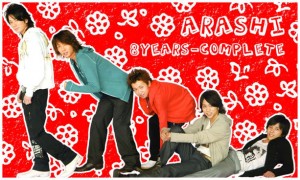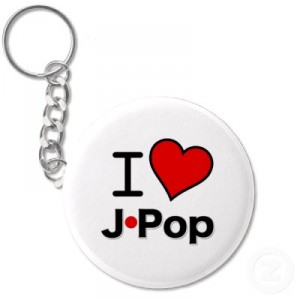J-pop. You can go almost anywhere in the world and find a J-pop fanatic. The melodies are catchy, the rhythm is upbeat and the singers are ultra-glamorous. But what is it exactly that makes J-pop so irresistible? The music itself is somewhat uncreative, and most of the “artists” are contrived, being told by their managers how to look, act and sing. According to Koizumi, the reason J-pop is so popular, in Japan at least, is precisely because it is all pretty much the same.

パフューム
“Common Music”
Japanese are known for being group-oriented—this is not a secret. Thus, the basis for many of their actions is less what they themselves want to do and more what the group wants them to do. While many people still do have their own tastes in music, they only share these tastes with certain people, if they share them at all. This is where the idea of “common music,” as Koizumi dubs it, comes in. She defines “common music” as any song that “everyone can sing together,” especially ones with “a cheerful character both in its words and music,” (Koizumi 113).
Japanese youth are especially reliant on “common music” to blend in. When they sing karaoke, for example, they are most likely to pick songs that everyone knows. This way, they can both fit in and keep others from feeling left out. One popular example of “common music” is SMAP’s 世界に一つだけの花 (Sekai Ni Hitotsu Dake No Hana)
Roughly translated, the lyrics to the chorus are:
Yes, each of us is
A flower there’s only one of in the whole world
Each of us has their own seeds
So let’s just do our best
To make them grow into flowers
[youtube]http://www.youtube.com/watch?v=I-WuMJJSW-M&feature=related[/youtube]
This song epitomizes “common music.” It is happy in nature, the melody is simple and catchy, and it is by a popular artist that everyone is sure to know. You can look at all the latest hits here.
Johnny’s and Idols

SMAP was produced by Johnny & Associates, a male talent agency that trains male idols. It is known in Japan as ジャニーズ, or Johnny’s. They are also responsible for producing Arashi, KAT-TUN, and NYC. Groups like these are made up cutesy ultra-chic (if not girly) men that, more often than not, posses no real singing ability. Because they cannot actually sing, a lot of the success of the groups is based upon how attractive they are, along with how their catchy their songs are and how these songs are received by the general public. The most recent Johnny’s group to be at the top of the charts is NYC Boys. Here is their song, 100% Yuuki, which was recently number one on the J-Pop charts.
[youtube]http://www.youtube.com/watch?v=xNHyWsZBq0I[/youtube]
Girl groups are popular as well. The same qualities that make boy bands popular (looks, familiarity, accessibility, etc.) make successful female J-Pop groups. One of the most famous girl groups is パフューム (Perfume) . Known for their techno-influenced beats and poppy hooks, Perfume has dominated the charts recently. The chorus of their latest hit, “Natural Ni Koi Shite,” can be translated:
Be in love naturally
Kiss me naturally
Love naturally; I want to hold hands like this
Be in love naturally,
Be arm in arm together naturally
Love naturally; nonchalant feelings are the most genuine
[youtube]http://www.youtube.com/watch?v=edyARJq9sgM&feature=related[/youtube]
A lot of J-Pop songs have almost no lyrical value. In “Natural Ni Koi Shite,” there are no deep meanings, the song was most likely written with no inspiration, and it sounds like every other song the group sings. This is precisely why it is popular. People know Perfume, and they know what to expect. They can hear one song and immediately know what the rest of their songs will sound like. There is even a catchy dance that they can learn with their friends. All these factors make it perfect “common music.”

J-Pop Abroad
While it is easy to understand the popularity of J-Pop in Japan, understanding its popularity in other parts of the world is somewhat more difficult. Even so, J-Pop is a vital part of Japan’s soft power, and is being exported all over the world, including China, Korea, Europe and America. It is still a niche market in Europe and America, but its presence has definitely not gone unnoticed by the general public. Of course, J-Pop is just one of the many aspects of Japan’s Gross National Cool, and while it is debatable what specifically attracts foreigners to it, there is definitely something distinctly Japanese about J-Pop. Ferranti’s definition of habitus may clear this up:
[habitus is] a way of theorizing social practice in terms of internalized habits of perception and aesthetic preference that mediate between group and individual practice; in the sphere of musical practice, habitus is a way of accounting for the fact that traits of some historical depth, which are often identified as emblematic indigenous aspects of music-making, are never wholly dormant… such traits can include particular melodic-rhythmic techniques and sonic preferences, and in contextual terms, modes of performative behavior and social practices for musical creation, transmission and performance (Ferranti 196)
In short, Ferranti suggests that whether J-Pop artists realize this or not, their music has unique Japanese aspects to it. These aspects must be what attracts foreign audiences to J-Pop, much like they are attracted to anime and manga for their Japanese qualities.
Conclusion
J-Pop is a product of post-modern Japan, fusing together elements of Western music with Japan’s own culture, to create something unique (and arguably meaningless). Japanese people like it because of its “common music” function, which allows them to fit into a society in which individualism is frowned upon. Foreigners like J-Pop for the Japanese aspect of it, as it is another “cool” thing made in Japan.
Discussion Questions
Is this “common music” idea unique to Japan, or do you feel it is incorporated into other cultures as well? What are your views on Johnny’s, and how do you think their ultra-feminine pop stars are affecting the Japanese image of masculinity? Why do you think some foreigners like J-Pop?
Entry contributed by Adam Labriny
As a fan of Japanese pop music, I really enjoyed reading this blog post. Your reference to the concept of “common music” definitely shed some light on the subject of why certain types of songs have become so popular within Japan. You also provided pertinent examples of current J-pop that provide a good basis for your arguments. When describing the cultural milieu that has produced J-pop, I think it would be better to generalize less and provide more specific references that support your claim that J-pop reflects group-oriented values, etc. in Japan.
I also would argue against describing J-pop as having “no lyrical value.” The term itself is rather vague, and I think that a song employing generic or over-used phrases in its lyrics is not the same as a song having no worth in its lyrics, so to speak. Is there a different term you could use to describe J-pop lyrics?
I really enjoyed your comparison of American and Japanese popular songs in class. I think expanding upon this comparison, using specific examples to bolster your arguments, would be a great asset to your final paper on J-pop music.